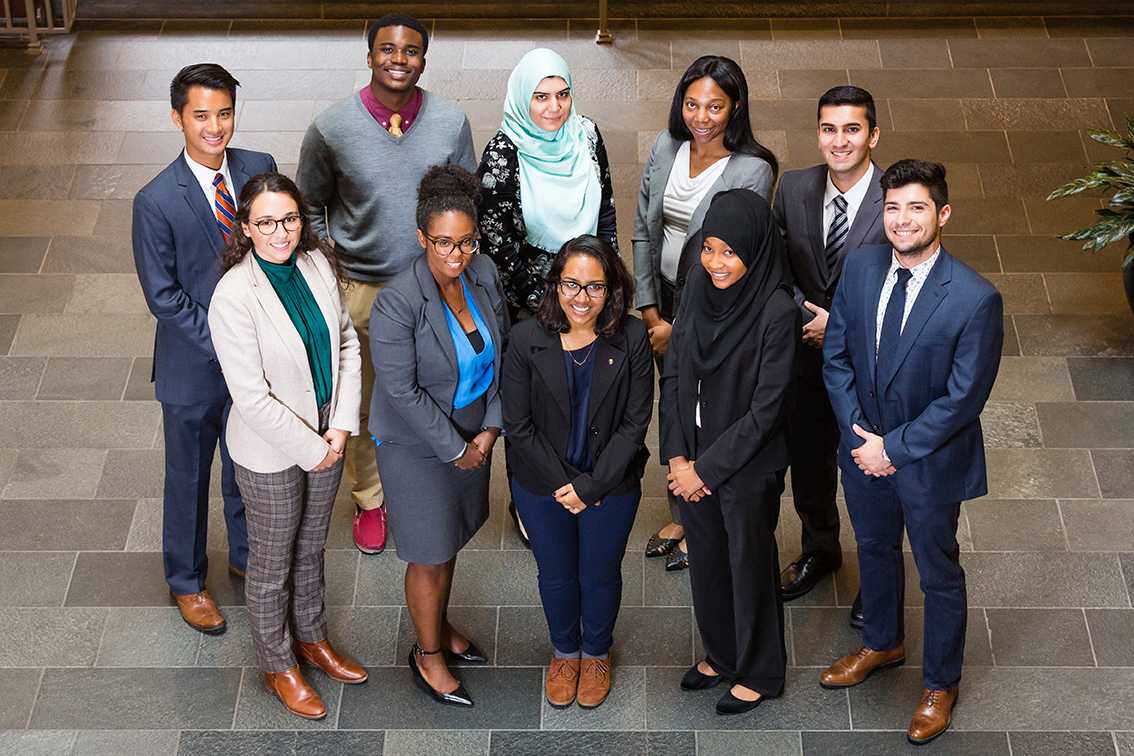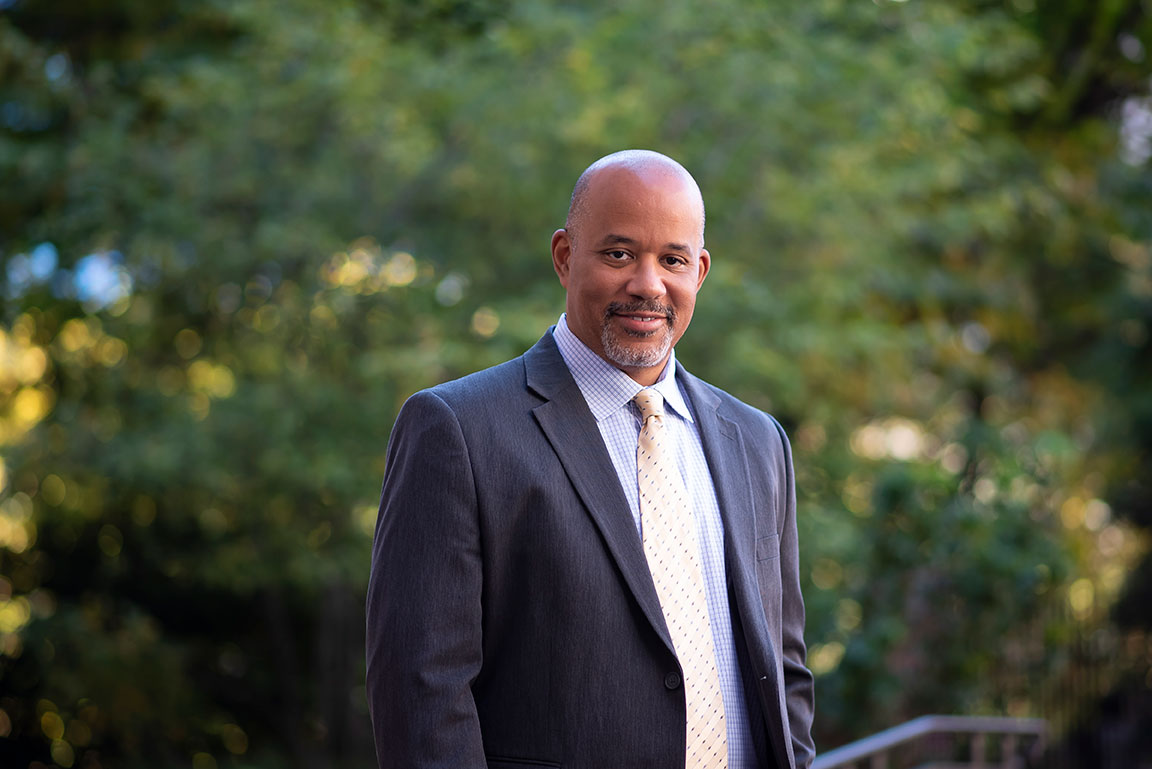 At Maryland Carey Law, we create a welcoming and supportive environment for students from all backgrounds. We believe that diversity of perspectives--shaped by economic or cultural background, race, gender, sexual orientation, disability, and philosophical outlook--is essential to legal education and the legal profession. If the ideals of justice and the rule of law are to retain their power, then legal education must attract people who can challenge each other's ideas and perceptions and who can draw upon each other's strengths in resolving disputes and building consensus within a plurality of perspectives.
At Maryland Carey Law, we create a welcoming and supportive environment for students from all backgrounds. We believe that diversity of perspectives--shaped by economic or cultural background, race, gender, sexual orientation, disability, and philosophical outlook--is essential to legal education and the legal profession. If the ideals of justice and the rule of law are to retain their power, then legal education must attract people who can challenge each other's ideas and perceptions and who can draw upon each other's strengths in resolving disputes and building consensus within a plurality of perspectives.

Professor Russell McClain, Associate Dean for Diversity and Inclusion
Professor Russell McClain coordinates the development and implementation of initiatives to increase the admission, retention, and graduation of students of color, and students from other underrepresented groups.
1L Peer Advisors
All first-year students are assigned peer advisors, who are upper-level students. These groups are small and include students from the same 1L section. Groups meet periodically during the year to provide support during the transition into law school. Peer advisors give advice on various topics such as adjusting to law school, preparing for final exams, getting involved in campus life, and selecting courses after the first year.
Academic Fellows
All first-year students are also assigned academic fellows who are upper-level students. These groups are small and include students from the same 1L section, as well. They provide guidance on briefing cases, outlining, preparing for final exams, and more.
Academic Advisor
Each incoming student is also assigned an academic advisor, often from a program of interest. This advisor is a faculty member at Maryland Carey Law and will serve as a mentor for the incoming student.
Disability Support Services
The UMB Office of Educational Support and Disability Services (ESDS) coordinates services to assist students and applicants with disabilities in obtaining reasonable accommodations through an interactive process involving the student and the school. The School of Law is governed by the disability and non-discrimination policies and procedures of the University of Maryland, Baltimore (UMB).
Aberdeen: Comparative Civil Rights
Aberdeen: Comparative Human Rights
Access to Justice Clinic: Effective Assistance of Counsel at Bail
Capital Punishment Seminar
Citizenship Seminar
Civil Rights of Persons With Disabilities Clinic
Comparative Constitutional Democracy Colloquium
Comparative Jurisprudence Seminar: Transcultural Perspectives on the World's Legal Systems
Criminal Defense Clinic
Criminal Law Seminar: Race and Criminal Justice System
Domestic Violence and the Law Seminar
Economic Justice: Race and Markets Seminar
Employment Discrimination Law
Environmental Justice, Human Rights, and Public Health
Fair Housing Clinic
Fair Housing Seminar
Families With Special Needs Children Seminar
Gender and the Law Seminar
Gender Violence Clinic
Health and International Human Rights Seminar
Human Rights in US Law: Legal Theory and Practice
Immigration Clinic
Immigration Policy Seminar
International Human Rights Seminar
JustAdvice Project
Justice for Victims of Crime Clinic
Juvenile Lifer Advocacy Clinic
Low Income Taxpayer Clinic
Mental Disability and Criminal Law Seminar
Opioid Epidemic: Law and Policy Seminar
Policing, Communities and Law Seminar
Post-conflict and Transitional Justice Seminar
Practicing Law in Spanish
Public Health and the Law
Public Health Law Clinic
Race and the Law Seminar: The Maryland Experience
Race, Technology and the Law Seminar
Restorative Justice
Restorative Justice & Sexual Assault Theory
Sentencing Reform Seminar
Sexual Violence and Harassment in Education
Sexuality and the Law Seminar
Small Business and Community Equity Development Clinic
South Africa Externship
South Africa: Race and Law Seminar
Thurgood Marshall Seminar
Women, Leadership and Equality Externship
Women, Leadership and Equality Zetzer Fellows Workshop
Youth, Education and Justice Clinic
Diversity & Inclusion Scholars
In 2017, we launched the University of Maryland Francis King Carey School of Law Diversity and Inclusion Scholarship Program in partnership with four law firms – DLA Piper; Gallagher, Evelius & Jones; Miles & Stockbridge; and Pessin Katz Law – that share our commitment to a diverse and vibrant legal community. Since launching we have welcomed six additional partners - Gordon Feinblatt; T. Rowe Price; Deloitte; Brown Advisory; Semmes, Bowen & Semmes; and Saul Ewing.
The program’s centerpiece is an endowed scholarship fund created through the generous support of our partners, along with matching funds from the University of Maryland Baltimore Foundation and investment from the School of Law. Each year, approximately 15 incoming students who contribute to the diversity of Maryland Carey Law are selected to be part of the program and receive scholarship support. Diversity Scholars must have demonstrated leadership and an ability to overcome challenges to their professional values and career goals.
While the endowed scholarship is the program’s cornerstone, the initiative takes a broad approach aimed at promoting and fostering diversity and inclusion at the School of Law. In conjunction with the School of Law’s Associate Dean for Diversity and Inclusion, the program is advised by a committee on diversity and inclusion, consisting of representatives from the partners. The committee facilitates and participates in mentorship programs and opportunities for student scholars to interact with the legal community, including for example:
- Individual mentoring from attorneys whose firms are part of the Initiative
- Firm-hosted networking events, lunches, or happy hours
- Inviting scholars to attend events in the Baltimore legal community, such as bar association meetings, networking receptions, etc.
- Law school diversity programing
- Mock interviewing and other skills-building exercises
These opportunities help the students with their networking skills, but also in their ability to create a connection to Baltimore.
Diversity Scholars enter the program as a community of scholars and have opportunities inside and out of the classroom to develop a sense of community and belonging. The scholars also participate in other social and networking events to build a sense of unity and community. While academic paths may diverge in the 2L and 3L years, the program is designed in a way that involves upper-class scholars (as mentors, role models, and advisors) throughout their time at Maryland Carey Law.
We have graduated a total of 52 students from the program since the first cohort graduated in the Spring of 2020 and have welcomed a total of 97 scholars to the program.
Cummings Scholarship
Established in 2019, The Honorable Elijah E. Cummings Scholarship pays tribute to Congressman Cummings, his many contributions to society, and his standing as one of Maryland Carey Law's most distinguished alumni. Created and endowed by the Maryland Carey Law Board of Visitors, this scholarship is awarded to students who demonstrate an interest in public service, a strong record of academic excellence, and financial need. Congressman Cummings was a leader both locally and nationally, and this scholarship aims to empower law students to become leaders in the legal community. The scholarship was awarded for the first time in 2020. Learn more about the scholarship here.
Rose Zetzer Fellows
Named for the first woman admitted to the Maryland State Bar Association, the WLE’s Rose Zetzer Fellowship program integrates theory and practice to prepare students for success in leadership positions in law, business, government, nonprofits, and the judiciary.
The fellowship combines leadership experience with a workshop focused on topics including personal negotiation, communication, strategic career planning, business development, fundraising, and organizational behavior and dynamics. Fellows also have the opportunity to meet prominent women lawyers in leadership roles who share their perspectives on the pressures, obstacles, and dilemmas they faced in achieving their positions.
Women, Leadership, and Equality Program
The WLE program was founded in 2002 and is the first program of its kind in the country. It is designed to produce lawyers, both male and female, who are aware of the barriers that women face when seeking positions of leadership in society and identify ways to support them in their pursuit of these roles.

